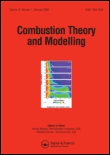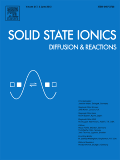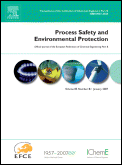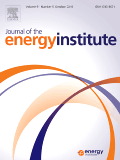
Solid Fuel Chemistry
metrics 2024
Illuminating the Path to Cleaner Energy Solutions
Introduction
Solid Fuel Chemistry is a pivotal journal published by PLEIADES PUBLISHING INC, dedicated to advancing knowledge in the fields of chemical engineering, chemistry, and fuel technology. With its ISSN 0361-5219 and E-ISSN 1934-8029, this esteemed publication has been contributing to the scientific community since its inception, covering extensive research from 1975 to 2024. Operating within the Q3 and Q4 quartiles, it holds a significant position among peers in its categories, ranked 94th in Energy & Fuel Technology and 212th in General Chemical Engineering. Although it lacks an open access option, the journal remains a vital resource for researchers, professionals, and students eager to explore innovative developments in solid fuels and their applications. The articles published in Solid Fuel Chemistry provide essential insights, facilitate collaboration, and inspire further research, making it an indispensable platform for anyone engaged in this essential field of study.
Metrics 2024
 0.20
0.20 0.80
0.80 0.80
0.80 20
20Metrics History
Rank 2024
Scopus
IF (Web Of Science)
JCI (Web Of Science)
Quartile History
Similar Journals

CHEMISTRY AND TECHNOLOGY OF FUELS AND OILS
Pioneering Research in Fuels and Oils for Sustainable ProgressCHEMISTRY AND TECHNOLOGY OF FUELS AND OILS, published by SPRINGER, is a pivotal journal dedicated to advancing the understanding and technologies surrounding fuels and oils. With its ISSN 0009-3092 and E-ISSN 1573-8310, this journal has been a reliable resource in the field since its inception in 1965, providing insights into the latest research and developments up until 2024. While it currently holds a Q4 status across various quartiles, including Chemical Engineering and Fuel Technology as of 2023, the journal's commitment to disseminating valuable knowledge plays a crucial role in nurturing the academic discourse surrounding energy and chemical processes. Although it does not offer Open Access, the journal is critical for researchers, professionals, and students aiming to deepen their expertise in energy engineering, chemical engineering, and fuel technology. Its contributions underlie significant advancements in sustainable energy practices and fuel innovations, making it an essential read for those engaged in these crucial scientific domains.

Korean Chemical Engineering Research
Fostering Insights from Korea's Chemical Engineering FrontierKorean Chemical Engineering Research, published by the Korean Institute of Chemical Engineers, serves as a vital resource for those engaged in the expansive field of chemical engineering. With an ISSN of 0304-128X and an E-ISSN of 2233-9558, the journal offers a platform for scholarly articles that cover various aspects of chemical processes, innovative technologies, and sustainability practices in engineering. Despite being in the Q4 category of chemical engineering journals as per the 2023 rankings, the journal's focus on emerging research from South Korea and beyond presents unique insights valuable to professionals, researchers, and students alike. Operating under effective citation metrics, it finds its place within Scopus, ranking at 229 out of 273, indicating a niche yet specialized contribution to the broader scientific community. We invite you to explore this integral journal, which is committed to fostering discourse and development in chemical engineering through its extensive archive, dating back to 2014 and continuing to evolve through 2023.

COMBUSTION THEORY AND MODELLING
Bridging Theory and Application in Combustion ResearchCombustion Theory and Modelling is a pivotal journal for researchers and professionals in the fields of chemical engineering, energy technology, and combustion science. Published by Taylor & Francis Ltd, this journal, with an ISSN of 1364-7830 and E-ISSN 1741-3559, provides a platform for disseminating significant advances in our understanding of combustion processes and their applications. With a solid impact factor, as reflected in its Q2 ranking across multiple categories including Chemical Engineering, Energy Engineering, and Modeling and Simulation, it serves not only to enhance theoretical knowledge but also to bridge the gap between theory and practical applications. The journal spans a wide timeline from 1997 to 2024, ensuring that it covers both foundational studies and cutting-edge research. Situated in the UK, the journal actively invites submissions that contribute to the evolving landscape of combustion science, making it an essential resource for academics, industry professionals, and students keen on exploring the dynamics of energy and fuel technologies.

Journal of the Pakistan Institute of Chemical Engineers
Catalyzing Research and Development in Chemical Engineering.The Journal of the Pakistan Institute of Chemical Engineers serves as a pivotal platform for advancing the field of chemical engineering within Pakistan and beyond. Published by the Pakistan Institute of Chemical Engineers, this journal aims to disseminate high-quality research, reviews, and case studies that cover a wide scope of topics relevant to chemical engineering, including process design, environmental technology, and materials science. Although it operates under a non-open access model, the journal is committed to maintaining rigorous peer-review standards to ensure the publication of impactful articles that contribute to the advancement of knowledge and best practices in the discipline. As a hub for researchers, professionals, and students alike, this journal not only fosters academic collaboration but also plays an integral role in shaping the future of chemical engineering in the region. With an ISSN of 1813-4092, it is dedicated to enhancing the visibility and accessibility of chemical engineering research, promoting innovation and education within the field.

SOLID STATE IONICS
Connecting researchers to the world of solid state ionics.SOLID STATE IONICS, published by Elsevier, is a prestigious academic journal dedicated to the field of solid state ionics. Since its inception in 1979, the journal has steadily contributed to the advancement of knowledge regarding ionic conduction in solid materials, which is paramount in a multitude of applications, from energy storage systems to sensor technology. As evidenced by its strong ranking in 2023—positioned in the Q2 quartile across Chemistry, Condensed Matter Physics, and Materials Science—SOLID STATE IONICS is recognized as a vital resource for researchers, professionals, and students alike, providing high-quality peer-reviewed articles that foster scientific collaboration and innovation. Its ISSN is 0167-2738 and E-ISSN is 1872-7689, with an ongoing publication schedule aimed at featuring cutting-edge research through 2024. As an essential conduit for the dissemination of important findings in the field, researchers seeking to publish their work or explore new frontiers in solid state ionics will find this journal an invaluable resource.

China Petroleum Processing & Petrochemical Technology
Empowering researchers with essential insights in energy technology.China Petroleum Processing & Petrochemical Technology is a critical journal published by the China Petroleum Processing & Petrochemical Technology Press, focusing on the pivotal advancements within the field of petroleum processing and petrochemical technology. With ISSN 1008-6234, the journal has been a significant resource since its inception in 1999 and aims to disseminate original research articles, reviews, and case studies that contribute to knowledge and innovation in energy engineering, fuel technology, and chemical engineering. Despite its current Q4 status in various quartile rankings, it provides essential insights and research that are invaluable for researchers, professionals, and students interested in these expanding areas. The journal is located in Beijing, China, and continues to strive for excellence in academia, encouraging contributions that address pressing challenges in the petroleum and petrochemical industries while fostering a deeper understanding of process chemistry and technology.

PROCESS SAFETY AND ENVIRONMENTAL PROTECTION
Innovating practices for a safer, cleaner environment.PROCESS SAFETY AND ENVIRONMENTAL PROTECTION, published by Elsevier, is a premier academic journal dedicated to advancing the fields of chemical engineering, environmental science, and safety management. With an impressive impact factor, this esteemed journal undergoes a meticulous peer-review process and serves as a vital platform for researchers, professionals, and students seeking to disseminate cutting-edge research and innovative practices. Submissions are welcome in a wide scope of topics related to safety, risk, reliability, and environmental engineering, demonstrating its influence as a Q1 journal across multiple categories, including Environmental Chemistry and Safety, Risk, Reliability and Quality. By providing a rigorous analysis of current challenges and solutions in the domain since its inception in 1990, it continues to foster interdisciplinary collaboration and practical applications in the United Kingdom and beyond. With the journal not currently offering Open Access options, subscribers gain exclusive access to pivotal insights that shape industry standards and drive advancements in sustainable practices.

JOURNAL OF THE ENERGY INSTITUTE
Transforming Energy Challenges into Sustainable SolutionsJOURNAL OF THE ENERGY INSTITUTE, published by Elsevier Science Ltd, is a leading interdisciplinary journal dedicated to the advancing fields of energy engineering and technology. With its ISSN 1743-9671 and E-ISSN 1746-0220, this journal has established a prominent reputation, evident from its impressive impact factor and strong rankings across multiple categories, achieving Q1 status in fields such as Condensed Matter Physics, Control and Systems Engineering, and Energy Engineering and Power Technology. As a pivotal resource for researchers, professionals, and students alike, the journal covers a comprehensive spectrum of topics in energy, including recent innovations in renewable energy technologies, sustainable practices, and advancements in fuel technologies. Researchers are encouraged to explore its open-access options for broad dissemination of knowledge, contributing to a more sustainable and energy-efficient future. With a converged history from 2004 to 2024, the JOURNAL OF THE ENERGY INSTITUTE remains a critical platform for cutting-edge research and development in the energy sector, promoting impactful solutions to global energy challenges.

Fuels
Fueling the Transition to Cleaner Energy AlternativesFuels is a premier open-access journal published by MDPI, focusing on the multifaceted field of fuel science, technology, and applications. Since its inception in 2020, this journal (E-ISSN: 2673-3994) has rapidly become a vital resource for researchers, professionals, and students engaged in the exploration of sustainable fuel alternatives, combustion technologies, and energy conversion processes. Located in Basel, Switzerland, Fuels aims to disseminate high-quality research that not only advances academic understanding but also addresses real-world energy challenges. By embracing an open-access format, it ensures that significant findings are readily available to the global scientific community, helping to foster collaboration and innovation in the transition to cleaner energy solutions. With an emphasis on interdisciplinary research and practical applications, Fuels is poised to be a leading journal that shapes the future of energy technologies.

Chemistry for Sustainable Development
Innovating Solutions for Sustainable ProgressChemistry for Sustainable Development is a leading journal dedicated to the exploration of innovative chemical studies that promote sustainability and environmental preservation. Published by the esteemed PUBLISHING HOUSE RUSSIAN ACAD SCIENCES, SIBERIAN BRANCH, this journal serves as a crucial platform for researchers, professionals, and students engaged in the field of chemistry, particularly those focused on sustainable practices and green technologies. With an ISSN of 0869-8538, the journal aims to bridge the gap between theoretical research and practical applications that align with sustainable development goals. By fostering interdisciplinary collaboration and sharing cutting-edge findings, Chemistry for Sustainable Development plays a vital role in addressing pressing global challenges such as climate change, resource depletion, and environmental degradation. Though currently not open access, the journal is committed to disseminating knowledge that inspires innovative solutions for a sustainable future.